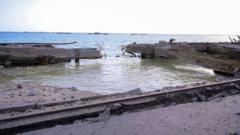With critical negotiations set to begin, Iran and the U.S. face significant hurdles. President Trump's ultimatum for Iran regarding its nuclear program may lead to further mistrust, complicating efforts for a diplomatic resolution.
Tensions Rising as Iran-U.S. Talks Approach a Critical Juncture

Tensions Rising as Iran-U.S. Talks Approach a Critical Juncture
Upcoming negotiations between Iran and the U.S. signal potential paths forward in curbing Tehran's nuclear ambitions amidst escalating geopolitical tensions.
As the U.S. prepares for high-level talks with Iran in Oman this weekend, the prospect of navigating through entrenched mistrust and substantial demands poses formidable challenges. The stakes are particularly high as geopolitical tensions escalate, particularly amid significant military and diplomatic rhetoric from U.S. President Donald Trump.
Experts like Sanam Vakil from Chatham House articulate the gravity of the current situation, stating, "We’re at a fork in the road, heading toward a crisis." Trump, while maintaining a bellicose stance at times — threatening Iran with unprecedented military action — also signals a willingness to negotiate, a duality that adds layers of complexity to the talks.
The upcoming discussions are complicated by the expectation that Iran’s Supreme Leader, Ayatollah Ali Khamenei, may view Trump’s stringent demands — which entail halting nuclear enrichment and dismantling existing nuclear infrastructure — as a severe affront to national sovereignty. Such terms may be rejected outright, reflecting deep-seated rivalries and the historical animosities between the two nations.
The strategic implications extend beyond just Iran and the U.S.; numerous Arab states in the region express anxiety regarding the potential fallout should military options be pursued. Countries from Egypt to Persian Gulf nations fear the destabilizing effects of conflict, particularly in light of the ongoing violence in Gaza.
While the dialogue is expected to include key figures such as Iran’s foreign minister Abbas Araghchi and Trump’s special envoy Steve Witkoff, the format of the discussions remains contested. Whether termed "direct" or "indirect," the involvement of these influential officials indicates that the outcomes could have significant repercussions on regional stability.
As both nations prepare for what might be a pivotal moment in U.S.-Iran relations, the outcome remains uncertain. The forthcoming negotiations will likely test both sides' resolve to compromise while addressing the looming specter of military confrontation and nuclear escalation.




















